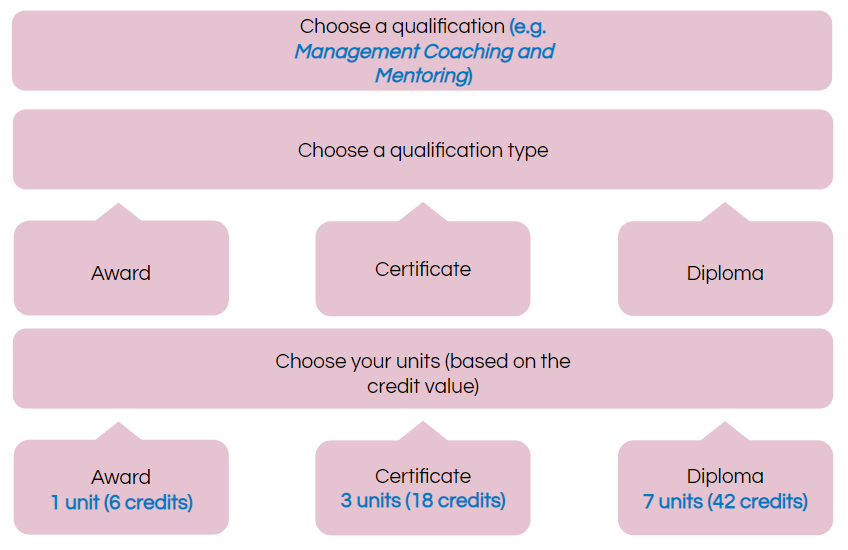CMI Level 5: Getting to grips with the qualification

Like a skyscraper or your favourite video game, CMI qualifications are made up of many levels!
Understanding the differences between the various CMI levels and where you should start can, at first glance, seem pretty confusing – which is why we’ve created a set of guides to introduce you to some of the most commonly taken CMI levels; Level 3, Level 5 and Level 7.
Here, our focus is on CMI Level 5. We’ll help you understand who this level is aimed at, the qualifications you may study for, and crucially, how you can attain your CMI Level 5 qualification!
So, as a good starting point…
1. Who is CMI Level 5 for?
2. CMI Level 5 equivalents
3. What does CMI Level 5 involve?
4. How long will it take?
5. How many units will I take?
6. How is CMI Level 5 assessed?
7. Comparison to CMI Level 3
8. Top tips for passing CMI Level 5
9. Where do I sign up?
1. CMI Level 5: who is it designed for?
Before we look at the specifics of CMI Level 5, we need to establish where it fits in in the range of CMI qualifications!
Aspiring, supervisory or line managers
Level 4/5
Middle managers
Level 6/7
Senior managers
Level 8
Senior directors and CEOs
As you can see, CMI Level 5 is designed for middle managers within an organisation. Typically, middle managers would lead a large team or department (generally, above the line manager or supervisor position, but below a senior manager).
To clarify this point a little more, CMI suggests that those in (or aspiring to be in) the following positions would be well suited to a Level 5 CMI qualification:
- Operations manager
- Divisional Manager
- Departmental Manager
- Regional Manager
- Specialist Manager
The only other formal stipulation regarding studying a CMI level 5 qualification is that you must be over 18.
Therefore, if you’re leading a large team, or are due to soon, and want to improve your management skills, or are eager to learn how to be a better coach, mentor or leader, you should definitely consider studying for a CMI Level 5 qualification.
Ultimately, however, the decision of whether you’ll be accepted onto a CMI course lies with the CMI provider you apply to (more on these later). CMI states that these organisations must ensure that they accept students who ‘have sufficient capability at the right level to undertake the learning and assessment’. So if you’re still unsure whether you’d be suited to a CMI Level 5 qualification, you should speak to your prospective CMI provider.

2. What qualifications is CMI Level 5 equivalent to?
When there are so many different qualifications and professional bodies out there, it can be tricky to gauge what any given qualification really provides you with. Thankfully, CMI has given us the answer!
CMI states that Level 5 qualifications ‘portray practical skills and competencies that are rated in academic terms as being comparable to Foundation Degrees and Higher National Diplomas (HND).’ Now that will look good on your CV!
3. What does CMI Level 5 actually involve?
Here, we’ll look into the details, requirements and practicalities of taking a CMI Level 5 qualification.
What course options do I have?
Management and Leadership
The most well-known and commonly-taken CMI Level 5 qualification is Management and Leadership. This is because it covers the broadest range of topics, and is the one that is applicable for most managers.
Within this qualification, you’ll have the option of taking units such as ‘Forming Successful Teams’, ‘Managing Conflict’, and ‘Creating and Delivering Operational Plans’. These units will equip you to be a great senior manager and teach you skills applicable in a wide range of organisations
The others…
However, you may decide that you want to take a CMI qualification which covers a more specific area of management. CMI has several options for you! These include:
Project Management
If you’re a manager who has a role in project management, you should definitely consider taking this qualification. You’ll learn how to plan projects, as well as techniques for overcoming problems and challenges so your project can achieve results!
Management Coaching and Mentoring
Coaching and mentoring are great ways to enable your teams to improve their skills and performance. If you’re eager to begin coaching and mentoring members of your team but are unsure where to begin, this is the course for you! (If you don’t want to commit to an entire qualification on coaching and mentoring, the Management and Leadership CMI qualification has units specifically on this)
Professional Consulting
If you are (or aspiring to become) a professional consultant, there are a number of key skills you’ll need! This course will teach you the most important of these, such as planning and managing consultancy interventions, the client relationship, communication and problem-solving tools and techniques.
Police Management
This CMI qualification is (you’ve guessed!) designed specifically for those within the police sector, progressing to the rank of Inspector. It covers a range of units from ‘Manage policing investigations in own area of responsibility’ to ‘Deploy resources for law enforcement operation’.
Managing Equality, Diversity & Inclusion
This qualification will enable you to understand the business case for equality, diversity and inclusion and how you can play a role in creating inclusive cultures. If this has been a problem within your organisation, or is something you wish to develop, this is the qualification for you!
4. How long is CMI Level 5 going to take me?
The answer to this question lies in which CMI qualification type you choose to take.
Once you’ve settled on a level and qualification, you’ll then have to choose a qualification type. For CMI Level 5, there are usually three qualification types to choose from: awards, certificates and diplomas.
The award is the shortest type of qualification – you’d generally take one unit (more on units coming up) from the qualification syllabus that covers a topic in-depth. You should consider this option if you cannot commit a lot of time to your studies, or if there is just one specific unit that you feel would be most beneficial for you to study, e.g. taking the ‘Using coaching and mentoring skills as a Manager’ unit from the Management Coaching and Mentoring CMI qualification. However, the big downside of this qualification type is that it won’t make you eligible to apply for Chartered Manager designation (the highest status in the management profession, which allows you to put the letters CMgr after your name!)
The certificate is a medium-size qualification type – it allows you to cover a few topics in-depth. So, if you have a bit of time on your hands and believe there are several relevant units that you wish to study, this could be the CMI qualification for you. Again, this qualification type won’t make you eligible to apply for Chartered Manager status.

The diploma is the largest qualification type – it includes a greater number of units and, therefore, covers a wider range of topics in-depth. Whilst it represents a significantly longer time commitment than the award and the certificate, if a broader appreciation of everything involved in management and leadership is what you’re after that takes you beyond your immediate needs, this is the one to choose. Crucially, this qualification type will enable you to apply to become a Chartered Manager with CMI through their ‘Fast Track’ scheme!
So, that said, in terms of time and credits (which we’ll talk more about shortly), for CMI Level 5, this translates as:
4-7 credits
40-70 hours (typically 1-3 months)
Level 5 Certificates
13-31 credits
130-313 hours (typically 3-6 months)
Level 5 Diploma
37-43 credits
370-430 hours (typically 6-12 months)

(You’ll notice that 1 credit = an estimated 10 hours of study time)
There’s an exception with the Management and Leadership Level 5 qualification, which offers an ‘Extended Diploma’, consisting of 54 credits to achieve!
You should also be aware that not all qualification types are available for all CMI qualifications. For example, the Level 5 qualification in project management is only available at the certificate level. Also, not all units can be taken at award level and certain combinations of units cannot be taken together to form the other qualification types. Details of all of these criteria and exceptions can be found on the syllabus documents – please ensure that you read it thoroughly.
The precise time your qualification will take to complete will depend on your CMI centre and your chosen learning style. However, CMI outlines the ‘Total Qualification Time’ (TQT) in each syllabus, which is an estimate of how long it takes to learn the content and complete the tasks. Don’t feel like you have to use a stopwatch to count your hours – many students can complete their studies below the estimated TQT, so it is absolutely ok if you don’t use the estimated time!
You can find the TQT for each qualification on CMI’s website. For example, if you’re seeking to gain CMI accreditation through the CMI qualification ‘Management & Leadership’ at the diploma level, you’ll have an estimated TQT of 370 hours.
5. How many units will I take?
Again, that depends on the CMI qualification and type you choose.
Each CMI qualification you choose will have a syllabus that’s divided into several units. A unit goes into detail on a specific topic, ranging from ‘Managing Stakeholder Relationships’ to ‘Creating and Delivering Operational Plans’. Each unit has something known as a ‘Credit value’, which is the number of credits you get from successfully completing that unit’s assessment tasks. To gain your qualification, you’ll need to undertake enough units and their related tasks such that you earn the required number of credits.
We understand that there has been a lot of talk about qualifications, qualification types and units, so we’ve summarised it for you in this diagram:

In the blue text, we’ve gone with the example of the Level 5 qualification, Management Coaching and Mentoring. In this course, each unit is worth 6 credits, and you can take any combination to reach the required number of credits. For example, if you wanted to take the Award qualification, you may decide to take the unit ‘Introduction to management coaching and mentoring’. If you instead decided to take the certificate you could take that unit, as well as ‘Coaching practice and theory’ and ‘Mentoring practice and theory’, to pick one combination. If instead you decide to take the Diploma, you’ll have to take all 7 units from the syllabus!
However, you may find in certain courses that the number of credits per unit varies and that stipulations exist over your combination of units, so it is always vital that you check out your course’s syllabus!
6. How is CMI Level 5 assessed?
Before too long, you’ll have studied the materials in the syllabus, and your mind will turn to the assessment! CMI Level 5 is assessed through a series of written tasks. These can be found in the unit assessment booklet documents after you have enrolled on the course.
The tasks will be closely linked with the content you’ve learnt from the syllabus, and you should take this opportunity to show off your acquired knowledge as you complete the requirements CMI has set!
Typically, each unit will have 2 or 3 tasks, although each one may be divided into smaller sub-tasks.
Once you’ve completed your assessment, it will either be marked internally by your course provider or be sent to CMI for marking. For each assessment, there are two possible options: pass or refer. If you pass, you’ll receive all of the credits that that unit is worth and be one step closer to completing your CMI qualification!

The other option is that the work is ‘referred’. This means that although your assessment did not reach the required standard for a pass, you have the option of amending and re-submitting it. You’ll be told which sections need improving, so you won’t be in danger of changing something which was Ok, to begin with! If your work is referred again, after this, you’ll have one final opportunity to update and re-submit it.
7. How does this differ from CMI Level 3?
If you’ve previously done a CMI Level 3 qualification, or you’re trying to decide between Level 3 and Level 5, you’ll notice a few changes between the courses and assessments. The biggest changes you’ll see are:
Assessment Length
Unsurprisingly, Level 5 assessments are longer than those at Level 3. Typically, the word-count guidance for assessments at Level 3 is between 2000-2,500 words, whilst those at Level 5 can be up to 5,000 words (although usually, they will be in the 3,000-3,500 word range).
Layout
In Level 3, you may have encountered tasks that required you to fill in details in a table. You are less likely to see this question style in Level 5, with tasks usually taking an essay format.
Sources
For Level 3, it’s unlikely that you’d have had to refer to many (or any!) academic sources. By this, we mean books or journal articles that outline specific models or theories. However, in CMI Level 5, the requirements take a step up, and when writing your essays, you will be expected to reference and engage with academic works.
Terminology
In Level 3, tasks often asked you to ‘Define’ or ‘Summarise’. However, in CMI Level 5, you’ll tend to be asked to evaluate and analyse the topics you have studied. The tasks may also take the form of writing a report or proposal to reflect the practical application of the material as you’ll meet it in your day to day work.
Crucially, for CMI Level 5, you’re not merely describing what you’ve learned but also offering critical analysis of the syllabus topics.
8. Top tips for passing CMI Level 5
When writing your CMI assessment, there are a few crucial things you need to keep in mind:
Use the assessment task glossary!
Can you tell the difference between discussing and differentiating? How is evaluating different from examining? Your task may use language that you’re not entirely familiar with, but it is crucial that you understand exactly what you’re being asked to do. When you’re unsure, make sure you check out Appendix 1 and Appendix 2 at the end of the CMI syllabus for your qualification, which contains a glossary of the common task verbs used.
Apply your knowledge!
CMI doesn’t want its members to simply learn theory and recite it! It wants to create better managers and leaders! So, to write an excellent assessment, you must show CMI that you understand the practical uses of the theory. You can do this by applying the theory to your own role and workplace or a workplace that you have researched.
Cite your sources!
You’ll be required to refer to various academic sources and theories in completing your tasks. CMI expects you to use the Harvard referencing system or the British Standard system when referring to other works – if you don’t reference correctly, you’ll struggle to pass your CMI assessment! CMI has outlined the required referencing format on their website.
This has just been a brief overview of CMI assessments and how you can pass them. If you want to learn more, we have an entire guide dedicated to CMI assessments!
9. I’m interested – where do I sign up?
You may be surprised to learn that you don’t actually register directly through CMI. Instead, you apply for the CMI course you’re interested in through a CMI centre (such as Astranti). There are over 850 CMI centres in the UK, and you can find the ones that offer your CMI qualification on CMI’s website.
There are many factors you need to consider when choosing a CMI provider, such as flexibility, teaching styles and course format – you’ll be pleased to know that we have a page that guides you through these steps.
The fees CMI course providers charge can vary, so it is important that you consider all of your available options. To enrol on a CMI course, you will have to pay a fee to CMI (this will be charged to your provider, so it will probably be included in your overall CMI course fee). Top-up fees are paid if you already have a CMI level 5 qualification but want to upgrade it, e.g. converting your Award into a Certificate.

Registration fee (£)
Award – 110
Certificate – 150
Diploma – 200
Extended Diploma – 250
Top-up fee (£)
Award – N/A
Certificate – 80
Diploma – 90
Extended diploma – 100
It is likely that the CMI centre you apply to will ask for information about your background, your management experience and why you want to take this CMI course, so it would be advantageous to prepare for these questions before you embark on the application process.
Once you’ve applied, been accepted and paid your fees, you’ll then finally be ready to start your CMI Level 5 studies. In that, we wish you all the very best!
Try Our Free CMI Level 5 Sample Course
If you’re worried about diving in too deep too early, why not check out our free CMI sample course first?
You can explore our CMI level 5 course for free by creating your free Astranti account. Click below to learn more about our courses or create your free Astranti account.

Holly Dymmock
Customer Service and Mentoring Supervisor
I hope you’ve found this CMI guide useful – but if you’ve got any further questions, leave a message and I’d be happy to help!
Comments
Illustration by Storyset.
